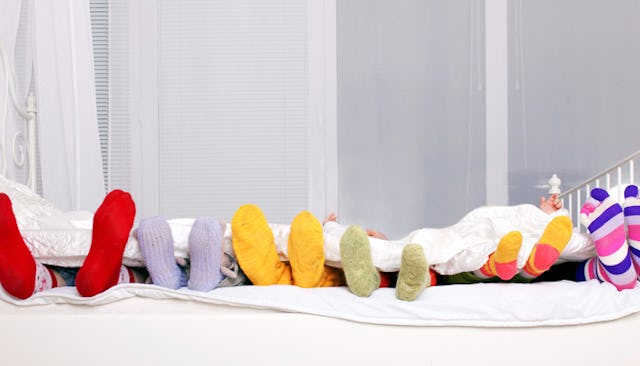Study Says Half Of Parents Who Co-Sleep Lie About It

Co-sleeping is probably more common than you think
It’s easy to ‘fess up a large number of parenting sins these days: “I let my kid watch too much TV,” “I can’t wait to drop them off at school in the morning,” “When they refuse to wear a jacket I’m glad when they get cold,” and so on. Many of these admissions get knowing laughs and high-fives from other parents, but there are still some choices that parents are reluctant to admit to, and one of them is co-sleeping.
For her book, Co-Sleeping: Parents, Children, and Musical Beds, Iowa State professor Susan Stewart spoke with 51 parents who co-sleep and found that about half of them did not discuss it with family members of their children’s pediatricians due to the shame and stigma associated with it. Though this is a small sample, it wouldn’t be the least bit shocking to find that this was true of most co-sleeping families.
Co-sleeping — or, to be more accurate, bed-sharing — is discouraged by the American Academy of Pediatrics due to its association with SIDS and other sleep-related infant deaths. But for every warning against bed-sharing, you are likely to find an equally persuasive argument for it. One point to consider is that bed-sharing is fairly common in the rest of the world: in an op-ed for the L.A. Times, Harvard Professors Sarah and Robert Levine point out, “In Japan…parents universally sleep with their infants, yet their infant mortality rate is one of the lowest in the world…and their rate of sudden infant death syndrome, or SIDS, is roughly half the U.S. rate.”
The idea that sharing a bed with an infant is dangerous is not universally accepted, and generally, if the rest of the world is doing something and you’re not, it’s worth considering why that is. It’s especially suspicious that the idea of having a child sleep in their own bed in their own room feels like another Western parenting construct, like not having even a sip of alcohol when you’re pregnant or protecting your child’s self-esteem at all costs. “Unfortunately,” Stewart told Babble, “American society does not take a village approach to child-rearing. It’s a very driven culture, and parents are led to believe that if anything goes wrong with their child, they are to blame.”
Of course, the controversy about bed-sharing is more focused on infants than on older children, but that doesn’t mean that parents who co-sleep with their older children are more up front about it. Though the safety risks are gone, bed-sharing with older kids has other stigmas attached to it: in one article in The Huffington Post titled, “The Dangers of Co-Sleeping With an Older Child and 6 Strategies to Stop It,” bed-sharing is linked to a lack of self-reliance, low self-esteem (of course), social challenges, marital stress, and the “compromised…psychological well-being of parents.” Holy smokes! Can you blame people for not wanting to admit to it?
Bed-sharing might not float your boat. You might think it’s dangerous. If so, then we recommend you not do it. If you believe in bed-sharing and think it’s the bee’s knees, then please, do you. Because this isn’t child abuse — this isn’t about whether or not it’s cool to beat your kids, it’s about sharing a bed with your children. You only have to look at any-damn-where-else to see that bed-sharing does not necessarily mean that a parent is choosing to put their child’s life at risk for the sake of convenience. If we look past our borders and into what the rest of the world does in their parenting, we might have a more open mind about our friends’ and family’s parenting choices.
(h/t Redbook)